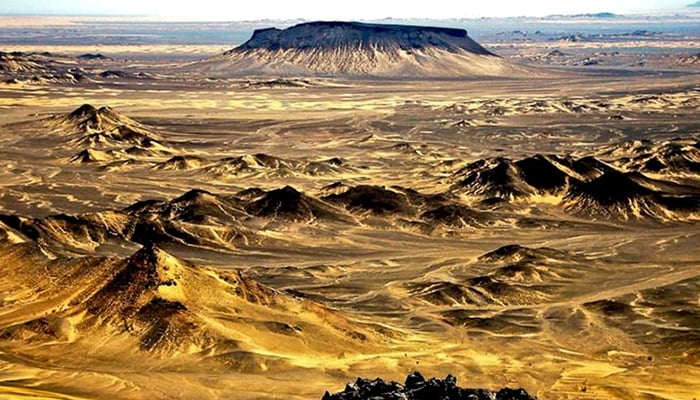- SC green-lights deal in unanimous verdict.
- A presidential reference was filed seeking SC’s opinion on agreement.
- The verdict was announced by CJP Umar Ata Bandial.
ISLAMABAD: The Supreme Court on Friday declared the agreement signed with the Canadian company Barrick Gold Corporation for the development of the Reko Diq mine in Balochistan “legal”.
The apex court green-lighted the deal while announcing its unanimous verdict in the presidential reference seeking its opinion on the matter. The 13-page verdict, which was reserved a week ago, was announced by Chief Justice of Pakistan Umar Ata Bandial today.
The court said that the constitution does not allow legislation against national assets, adding that the provinces can make changes in the laws related to minerals.
“There is nothing illegal in the new agreement,” said the court. It added that the agreement was not against the 2013 verdict given by the top court.
The SC also shared that the agreement was not against the environment.
The court also noted that the experts had informed it that the agreement was inked between the federal and provincial governments. However, once the Balochistan Assembly was taken into confidence they backed the agreement.
“As per the Riko Diq agreement, most workers will be Pakistanis. This is not for a single person but for Pakistan. There is nothing illegal in this agreement,” said the court.
The court stated that Barrick Gold Corporation has assured it that labour laws will be implemented and the company will also fulfil its social responsibility.
“The foreign investment bill is not exclusively for Barrick Gold. The foreign investment bill is for companies that will invest more than $500 million dollars,” said the court.
Reko Dik agreement
In March of this year, Imran Khan, who was the prime minister at the time, announced the successful agreement with the Canadian firm for the development of the Reko Diq mine in Balochistan, saying it will create 8,000 new jobs for the people.
“I congratulate the nation and people of Balochistan on successful agreement with Barrick Gold for development of Reko Diq mine,” he tweeted.
In a separate statement, Barrick Gold Corporation confirmed that they have reached an agreement with the federal and Balochistan governments on a “framework that provides for the reconstitution of the Reko Diq project”.
According to the mining company, Barrick “will be the operator of the project which will be granted a mining lease, exploration licence, surface rights and a mineral agreement stabilising the fiscal regime applicable to the project for a specified period”.
“The process to finalise and approve definitive agreements, including the stabilisation of the fiscal regime pursuant to the mineral agreement, will be fully transparent and involve the federal and provincial governments, as well as the Supreme Court of Pakistan. If the definitive agreements are executed and the conditions to closing are satisfied, the project will be reconstituted including the resolution of the damages originally awarded by the International Centre for the Settlement of Investment Disputes and disputed in the International Chamber of Commerce,” said the statement.
Later, the then finance minister Shaukat Tarin shared details of the agreement and said that Barrick Gold would retain 50% of the shares. While the rest of the shares will be divided between the federal government and the provincial government of Balochistan.
The 25% share of the federal government would be divided between the State-Owned Enterprises Oil and Gas Development Company (OGDCL), Pakistan Petroleum Limited (PPL), and Government Holdings Pakistan (GHPL).
Presidential reference
But in October, President Dr Arif Alvi, on the advice of Prime Minister Shehbaz Sharif, filed a reference in the Supreme Court, seeking its input on the deal.
The president had asked two legal questions in reference: (1) whether the Government of Balochistan or Government of Pakistan can enter into an international agreement as per Supreme Court’s Judgment, in Molvi Abdul Haq vs Federation of Pakistan 2013 Case, and (2) if the proposed Foreign Investment (Protection and Promotion) Act 2022 would accord to the constitution?
What is Molvi Abdul Haq case?
Today’s Reko Diq Project Agreement was earlier called Chaghai Hill Exploration Joint Venture Agreement (CHEJVA).
Barrick Gold and Antofagasta Company sought a mining lease extension from the Mines and Mineral Development Department of Balochistan for their exploration in 2011.
The department rejected their request following which the two companies entered into litigation against the governments of Pakistan and Balochistan at two separate international forums, on the basis of $240 million spent by them on exploration.
The government of Pakistan faced a suit for specific performance in the extension of lease in the International Center for Settlement of Investment Disputes (ICSID) while the Balochistan government had to face a case in the International Court of Arbitration (ICC). The ICSID decided the matter against Pakistan, fulfilling all demands of the investor’s companies.
The Supreme Court on January 7, 2013, declared the CHEJVA as illegal, null and void.
The court held that there were severe violations of basic legal requirements and a lack of due diligence in the Reko Diq Project.
The investor companies again filed a lawsuit against Pakistan with the ICSID whose tribunal, in 2019, announced a $6.927 billion award against Pakistan for violation of the agreement. The ICC also ruled against Pakistan but the award is yet to be announced. Legal Experts are of the view that the ICC award against Pakistan will be around $3 billion.


 Entertainment2 days ago
Entertainment2 days ago
 Latest News1 day ago
Latest News1 day ago
 Latest News1 day ago
Latest News1 day ago
 Latest News1 day ago
Latest News1 day ago
 Latest News1 day ago
Latest News1 day ago
 Entertainment2 days ago
Entertainment2 days ago
 Latest News1 day ago
Latest News1 day ago
 Latest News1 day ago
Latest News1 day ago





















